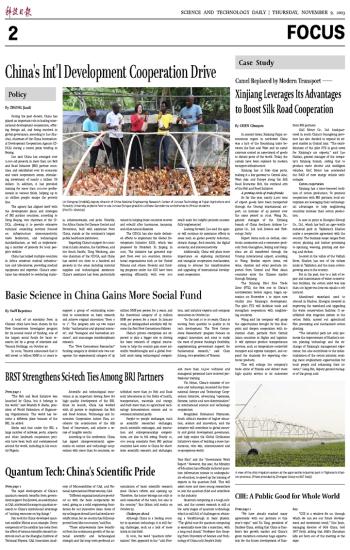
 |
| A view of the drip irrigation system at the agro-textile industrial park in Tajikistan's Khatlon province. (Photo provided by Zhongtai Group to S&T Daily) |
In ancient times, Xinjiang Uygur autonomous region in northwest China was a hub of the flourishing trade between the East and West and its camel caravans carried an assortment of goods to distant parts of the world. Today, the camels have been replaced by modern transport infrastructure.
Xinjiang has 17 first-class ports, making it a key gateway to Central Asia, West Asia and Europe along the Silk Road Economic Belt, the overland arm of the Belt and Road Initiative.
A growing circle of trade friends
So far this year, nearly 2,400 tons of export goods have been transported through the Urumqi international airport, an increase of 45 percent over the same period in 2019, Wang Xu, general manager of the Xinjiang branch of China Southern Airlines Logistics Co., Ltd. told Science and Technology Daily.
Export items such as clothes, electronic accessories and e-commerce products from Guangzhou, Beijing and Hangzhou are all transferred through the Urumqi international airport, according to Wang. Besides export items, red wine, cherries and other products imported from Central and West Asian countries enter the Chinese market through Xinjiang.
The Xinjiang Pilot Free Trade Zone (FTZ), the first one in China's northwestern border region, began operation on November 1 to inject new vitality into Xinjiang's development. The pilot FTZ will facilitate trade and strengthen cooperation with neighboring countries.
Wang said his company will grasp the opportunities brought by this blueprint and deepen cooperation with industrial chain partners from Central Asian countries in flights and logistics. It will optimize product transportation services, such as temperature-controlled transport and express transport, and expand the channels for exporting electronic products.
This will enlarge the company's trade circle of friends and deliver more high-quality service to its customers from BRI partners.
GAC Motor Co., Ltd. headquartered in south China's Guangdong province has also decided to expand its export market in Central Asia. "The establishment of the pilot FTZ is good news for Xinjiang's car exports," said Luo Haitian, general manager of the company's Xinjiang branch, adding that to produce more electric and intelligent vehicles, GAC Motor has accelerated the R&D of new energy vehicle technologies.
Cotton cooperation
Xinjiang has a time-honored tradition of cotton production. To promote cooperation with BRI partners, local enterprises are leveraging their technological advantages to help neighboring countries increase their cotton production.
A case in point is Zhongtai (Group) Co., Ltd., which has built an agro-textile industrial park in Tajikistan's Khatlon under a cooperative agreement with the country. The business scope ranges from cotton planting and leather processing to spinning, weaving, printing and dyeing, and clothes.
Located in the valley of the Vakhsh River, Khatlon has one of the richest lands in Tajikistan and the main cottongrowing area in the country.
But in the past, due to a lack of repair and maintenance of water conservation facilities, the cotton yield was less than 100 kg per mu (one mu equals 0.067 hectare).
Abandoned wasteland used to abound in Khatlon. Zhongtai invested in improving the wasteland and upgrading the water conservation facilities. It established drip irrigation system in the cotton fields, carried out agricultural film processing and mechanized cotton planting.
"The industrial park not only promotes the improvement of Khatlon's cotton planting technology and the exchange of Xinjiang's management experience, but also contributes to the industrialization of the cotton industry, creating more employment opportunities for local people and enhancing their income," Liang Bin, deputy general manager of the group, said.


 Next
Next




